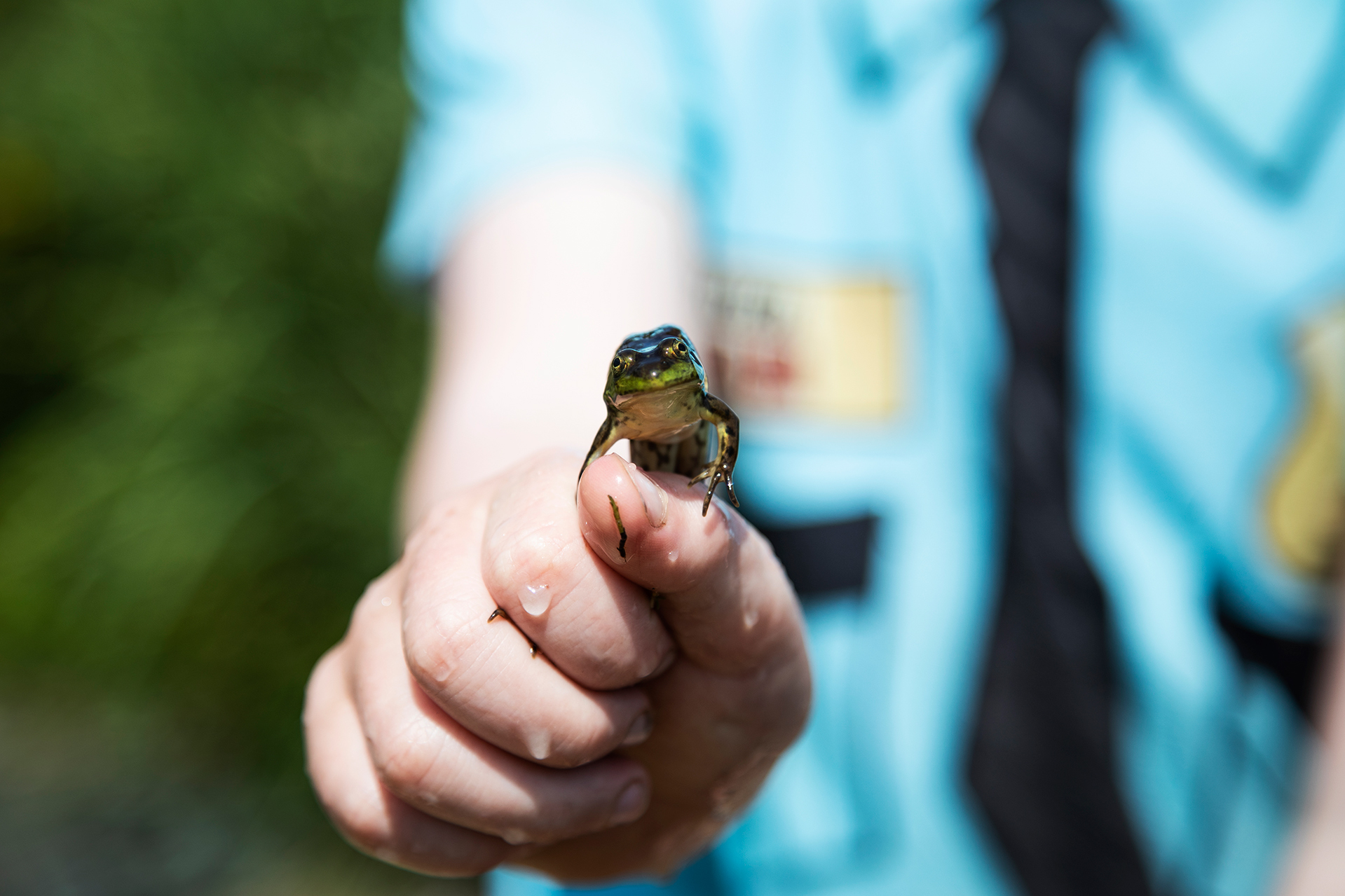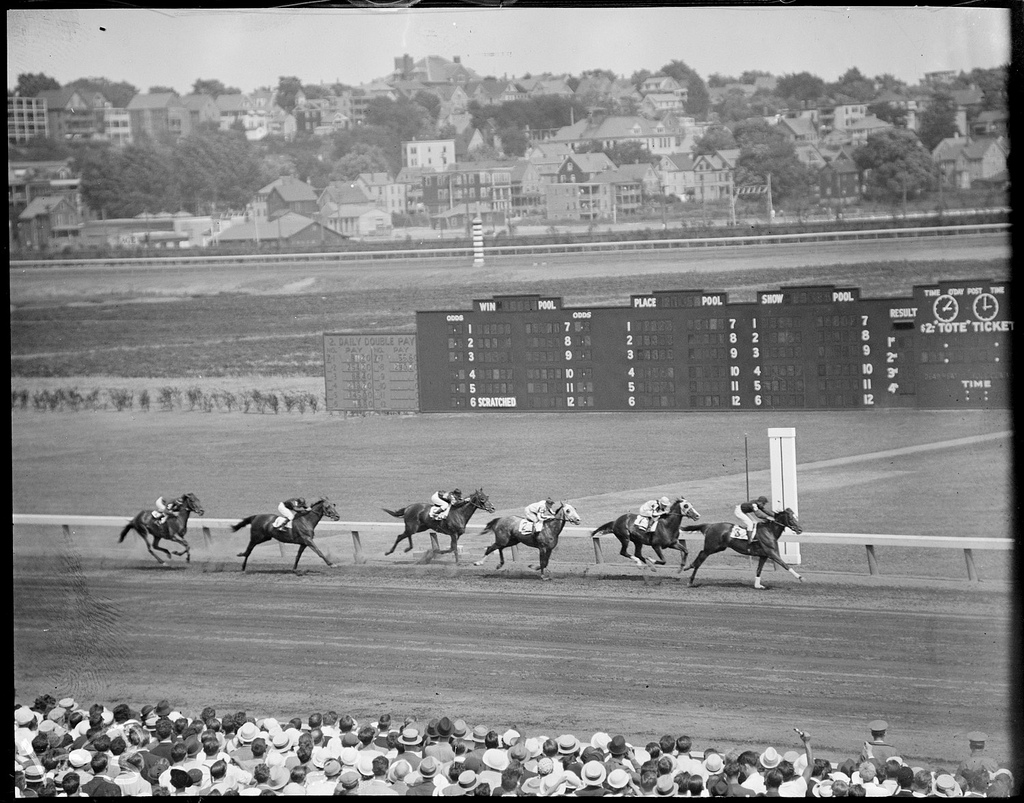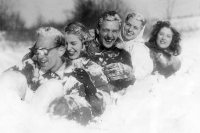
Eric Stirling ’97 and his family represent a longstanding vacation tradition that’s virtually unique to Maine: the wilderness sporting camp.
In 2003, Eric became the sixth generation of his family to operate West Branch Pond Camps, comprising nine cabins and a 105-year-old lodge down 10 miles of unpaved road in remote Township A, Range 12, between Moosehead Lake and Millinocket.
My Maine Summer
From Kennebunk to Katahdin, from lobsters to lakes, we offer My Maine Summer — profiles of alumni whose work, play, and family life has a distinctive Maine-in-summer vibe.
The meals are hearty, the lodgings rustic, the moose abundant, and the views across the pond to White Cap Mountain reassuring. The camp attracts fly-fishers, hunters, hikers, canoeists, skiers — and folks simply seeking peace, quiet, and refuge from the 21st century. Who needs cell phone or internet service when there’s unforgettable dark-sky stargazing?
The newest buildings at West Branch Pond Camps date from 1935. In 1881, the site evolved from a logging camp to a base for moose hunters and then, established as a sporting destination, was purchased by a Stirling ancestor in 1910. Back then the camp was one of hundreds in Maine that gave visitors, known as “sports,” opportunities to fish, hunt, and rusticate in remote, largely unspoiled woodlands.
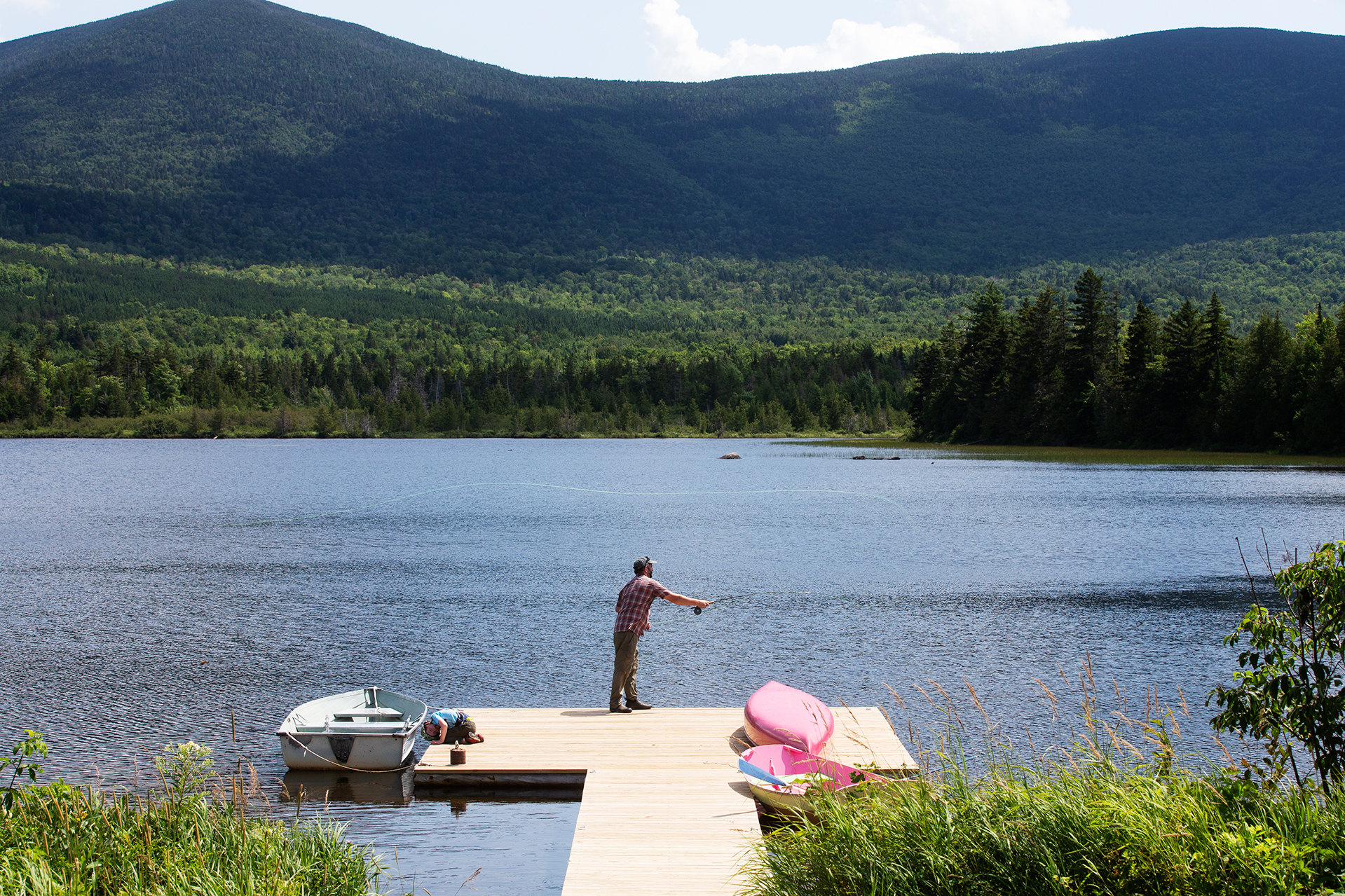
With White Cap Mountain impressive in the distance, Eric Stirling ’97 casts for brook trout from the dock at West Branch Pond Camps in early August. (Theophil Syslo/Bates College)
These days, Nordic skiers make February the busiest month, but West Branch Pond Camps’ history is rooted in summer. Both prompting and enabling the sporting camp phenomenon, 19th-century industrialization made cities unhealthy places to be in the summer — but it also grew an affluent class that could afford North Woods escapes, and spawned railroads and other transportation to carry sports deep into Maine.
Stirling lives at West Branch Pond with his wife, Mildred Kennedy, and their children, Avis and Oscar.
West Branch Pond Camps was your family business and you spent summers there as a young person. What are some formative memories?
Our customers usually took quite an interest in myself and my two brothers, the way we were growing up. We weren’t official Maine Guides, but we’d take them out on the trails and up the mountains. We just knew the area well enough to take people out if they wanted to fish in streams or climb a mountain or look for moose. That was definitely one of the biggest highlights of growing up here — the people who came here to be part of it.
My grandfather was a Maine Guide and he used to take us on canoe trips in the summertime up to the Allagash, Chesuncook Lake, and other places north. Which was funny because — we didn’t know it at the time — we were growing up in the best area, but we still liked to go to even more remote areas.
You graduated from Bates in 1997 and began running the camps in 2003. What persuaded you to go back to West Branch Pond?
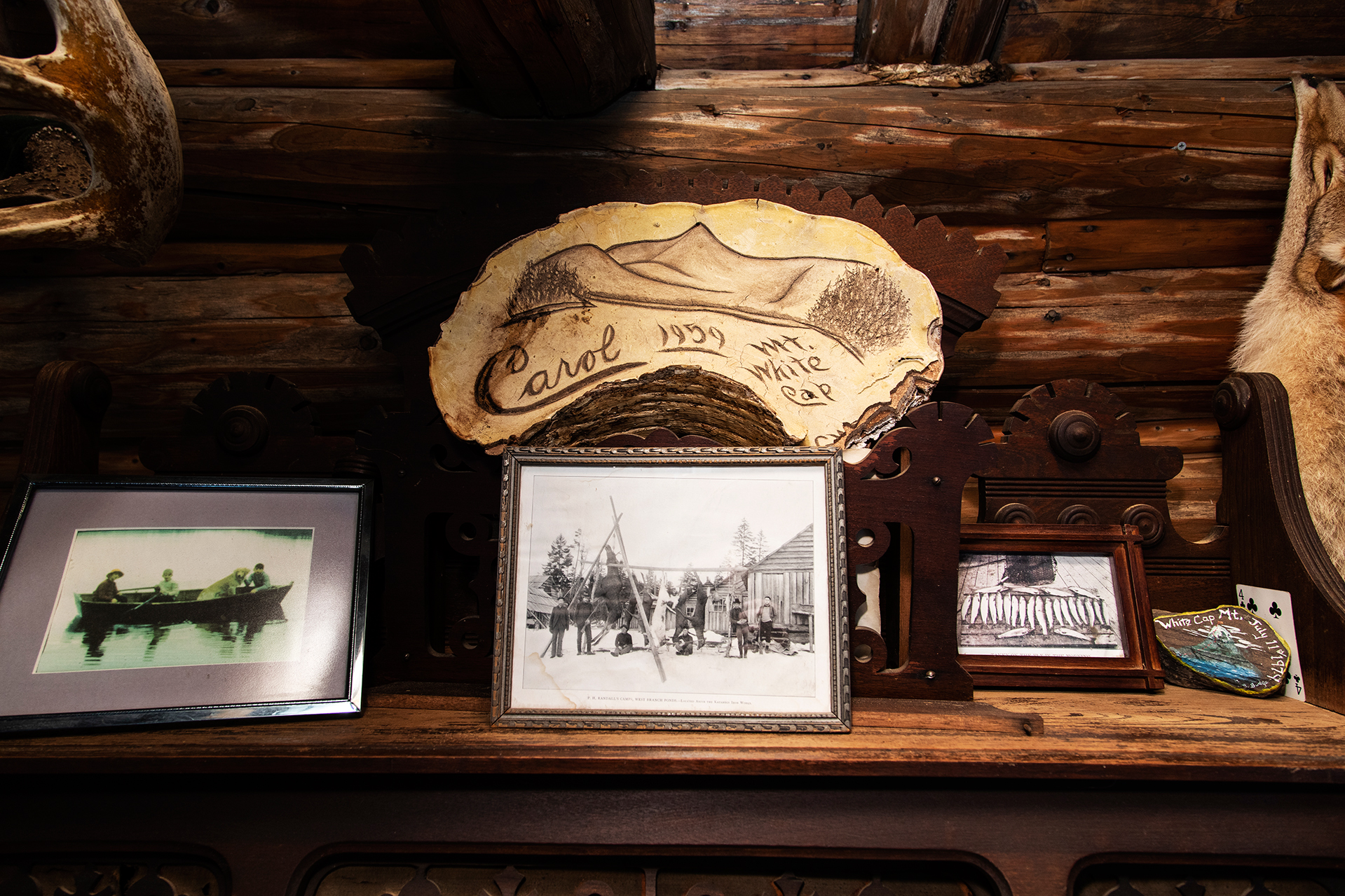
Vintage photos and memorabilia on display in the West Branch Pond Camps dining hall. (Theophil Syslo/Bates College)
I did a number of different things after Bates. Probably the longest was teaching algebra for three years. I worked on an organic farm and cross-country ski center, picked blueberries — it was nice to get out and do something different.
But having grown up at West Branch Pond with the seasonal lifestyle, being in the woods, and the whole family legacy, after I’d been out for six years I was able to see it from an outside perspective and realize how special it was, basically.
Summer and work are more or less synonymous for you. Do you look forward to summer?
Yes, I do. There are parts of it that seem never-ending, like mowing the lawn, keeping up with the vegetation, and things like that. But, yeah, I generally do look forward to it. I like all the seasons — but the spring is very busy with fishermen and getting the camps up and operating, and it doesn’t feel like we get that done until summer actually starts.
And then for the rest of summer, everything is kind of cruising, it’s like a big ship — you get underway and then you can just enjoy the cruise, hopefully!
So what are some particular pleasures of summer for you, both related to work and not related to work?
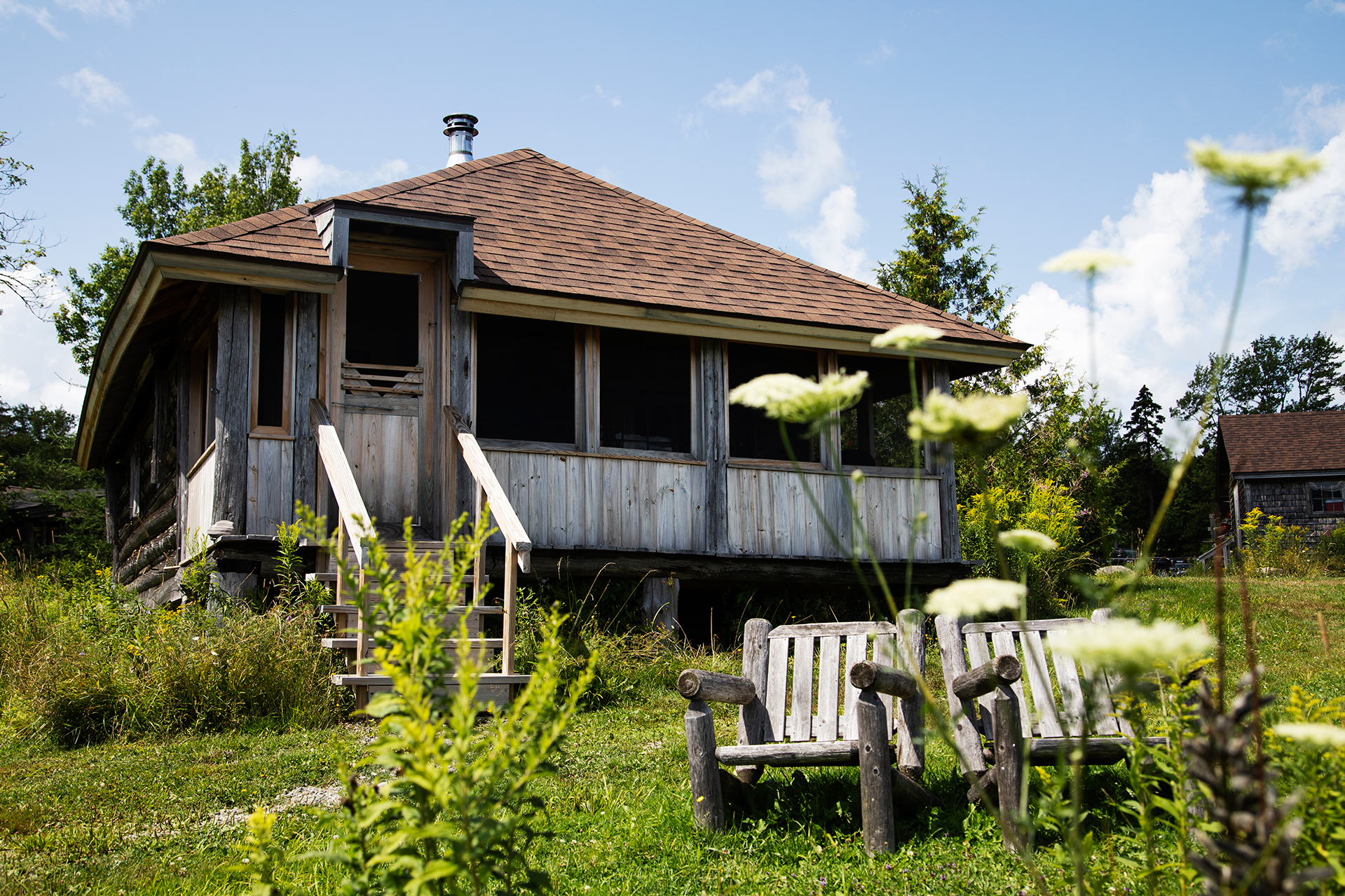
A cabin at West Branch Pond Camps. The newest building at the sporting camp was built in 1935. (Theophil Syslo/Bates College)
Related to work, it’s probably the families who come back every year, seeing them enjoy the camp. One of the best things is seeing my kids spending time with the customers’ kids, and just watching the generational turnover. We get a lot of grandparents who bring their kids back, and their kids have kids now.
Not related to work, the best thing is not having to put on all the winter clothes just to get out and walk. Usually in the evening, after we get done with work, I’ll take the kids or the dog and just walk on the trail, and just have some time to unwind and enjoy the fact that it’s summer. The days are so long, the night sounds are great, the frogs and all. It’s everything that you don’t get when it’s cold, which is a lot of the time here.
How does the West Branch Pond Camps experience represent an ideal Maine summer?
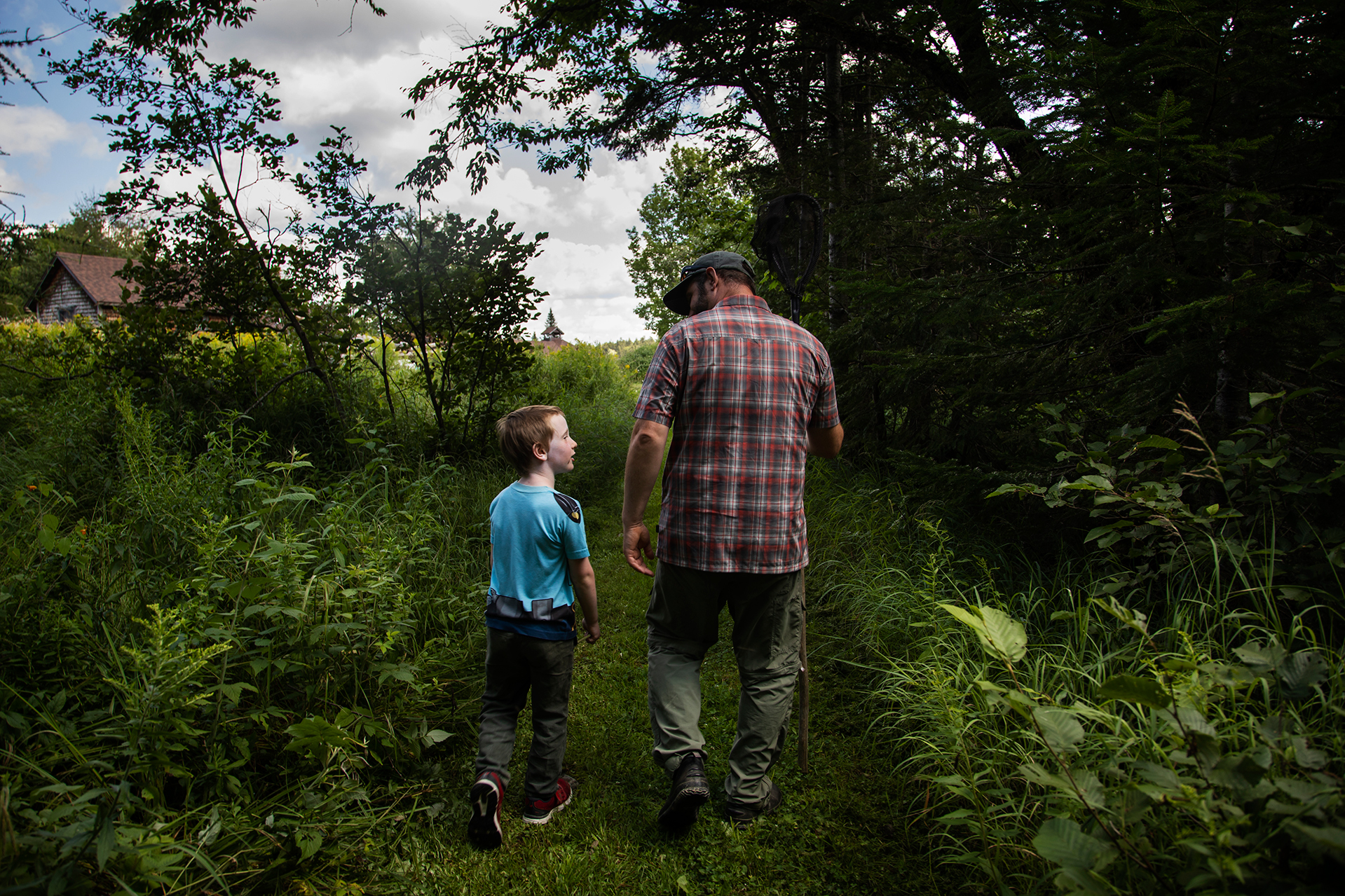
Summer is lush green as Oscar, left, and Eric Stirling ’97 follow a path at West Branch Pond Camps. (Theophil Syslo/Bates College)
The biggest thing is being unplugged. We don’t have any internet, and so everything that goes on here is based on what’s here and has been here for pretty much forever — peace and quiet, the rustic quality. We’re just modern enough that it’s comfortable, but that’s it.
We’ve intentionally kept away from modernization and the amenities that a lot of places have brought in because they’ve either had to just to survive — to get the customers they need — or it’s not a priority to create an aesthetic where you don’t have internet access, you don’t have lots of ATVs around. We have the good fortune of getting plenty of business without doing that, and now we see people who are actively seeking that out.
We get a lot of people who were coming here when my grandfather was running it, for example, and they might not have been back for 40 years. And they come back and can’t believe that it looks pretty much like they remembered it.
What environmental changes have you seen from summer to summer?
There’s no doubt that it’s consistently warmer, particularly at night. My customers comment a lot that they don’t run the wood stove to stay warm as much as they used to. That was a lot more common when I was a kid. Some people really miss that.
A major thing we’ve seen is bullfrogs — when I was a kid we never had bullfrogs. That probably has something to do with their range expanding due to some advantage they have with warmer overall temperatures. That’s an ecological impact because bullfrogs actually eat every other frog that they can find — they’re called bullfrogs because they take over, basically. Now we have a lot of bullfrogs in the pond, and they’re loud. It’s not bad, but it’s definitely different.
On a positive note, the lands around here have all transitioned to conservation land. When I was a kid, they were all industrial forestland, and they were clear-cut very heavily. That transition is actually what’s enabled our winter business, the cross country skiing, because we can build trails and maintain them without worrying if they’re going to destroyed by logging operations.
